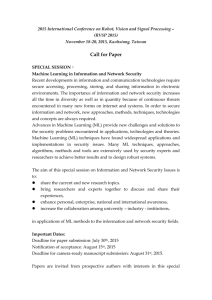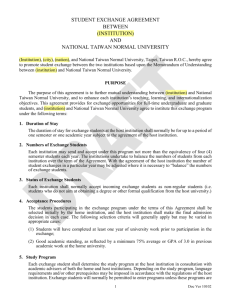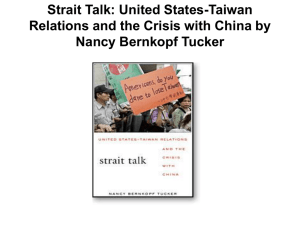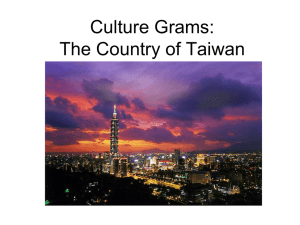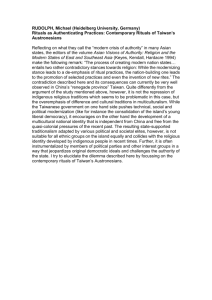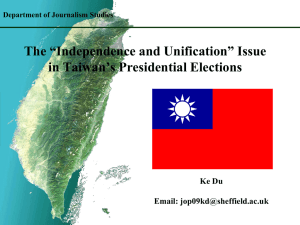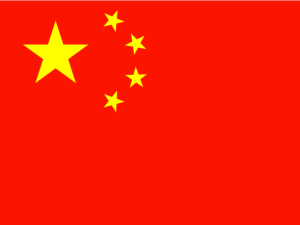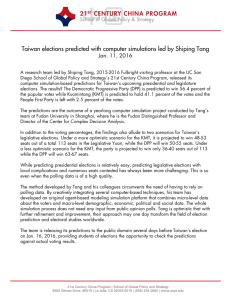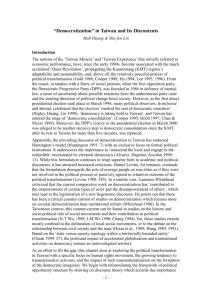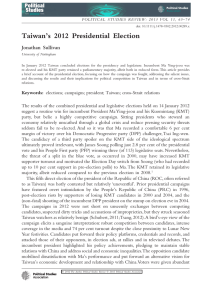Taking Rights Seriously: A Report from Taiwan
advertisement
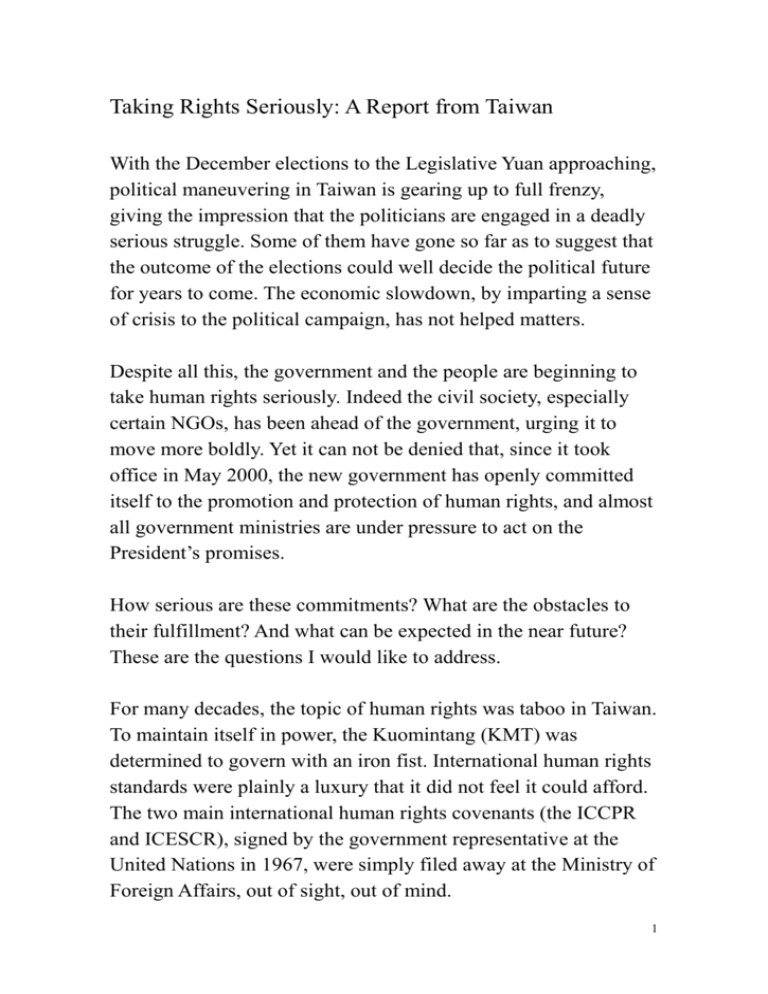
Taking Rights Seriously: A Report from Taiwan With the December elections to the Legislative Yuan approaching, political maneuvering in Taiwan is gearing up to full frenzy, giving the impression that the politicians are engaged in a deadly serious struggle. Some of them have gone so far as to suggest that the outcome of the elections could well decide the political future for years to come. The economic slowdown, by imparting a sense of crisis to the political campaign, has not helped matters. Despite all this, the government and the people are beginning to take human rights seriously. Indeed the civil society, especially certain NGOs, has been ahead of the government, urging it to move more boldly. Yet it can not be denied that, since it took office in May 2000, the new government has openly committed itself to the promotion and protection of human rights, and almost all government ministries are under pressure to act on the President’s promises. How serious are these commitments? What are the obstacles to their fulfillment? And what can be expected in the near future? These are the questions I would like to address. For many decades, the topic of human rights was taboo in Taiwan. To maintain itself in power, the Kuomintang (KMT) was determined to govern with an iron fist. International human rights standards were plainly a luxury that it did not feel it could afford. The two main international human rights covenants (the ICCPR and ICESCR), signed by the government representative at the United Nations in 1967, were simply filed away at the Ministry of Foreign Affairs, out of sight, out of mind. 1 It was not until the mid-1980s that political reforms were initiated by President Chiang Ching-kuo, in part to accommodate the growing challenge of the opposition, known as the “tang-wai” (literally, “outside of the party (i.e., the KMT)”). The Democratic Progressive Party (DPP), which became the ruling party last year, was established in 1986. When Vice President Lee Teng-hui assumed the presidency upon Chiang’s death in January 1988, it was obvious that a new era had been ushered in. The control exercised by the government was gradually relaxed, and opposition politicians increasingly tolerated (if not in fact tacitly encouraged by Lee as a counterweight to his more conservative rivals within the KMT). In addition, new social movements sprang up to promote democratic reforms and the protection of human rights for various disadvantaged groups, such as women, laborers, and indigenous peoples. Long-suppressed energy and creativity was released, and a sense of excitement prevailed, especially among the youth. Beginning in 1998, the idea of creating a national human rights commission was taken up in informal discussions among NGOs. In December 1999, some twenty-two NGOs announced the formation of a coalition to promote the project. Two working groups were set up. One group was charged with persuading the candidates in the March 2000 presidential elections to pledge their support, and the other group was given the task of drafting a bill to establish a national human rights commission which would reflect the values and commitments of the civil society. The presidential campaign was then moving into high gear. Lien Chan, the KMT nominee, was first to endorse the project, and the 2 DPP’s Chen Shui-bian and the others followed suit. After Chen’s election victory, the first working group continued their efforts, in order to convince the president-elect that he should openly commit himself to the cause of human rights in his inaugural address on May 20. Reliable sources reported that it was not until the very last minute that Chen and his close advisors agreed to discuss human rights in his inaugural speech. To the surprise and amazement of the international community, the President pledged to return to the international human rights standards -- he mentioned particularly the Universal Declaration of Human Rights, the International Covenant on Civil and Political Rights, and the Vienna Declaration and Program of Action of the 1993 World Conference on Human Rights --making them the foundation of the legal system in Taiwan. He made three specific solemn pledges on behalf of the new government: first, he would request the Legislative Yuan to ratify the International Bill of Rights; secondly, he would create an independent national human rights commission; and thirdly, he would invite Amnesty International and the International Commission of Jurists to advise him as how to implement his commitment through further measures to protect human rights. The second working group set up by the coalition took six months to complete its assigned task of drafting a bill for the national human rights commission. It was decided early on that the draft legislation must confirm to the minimum standards of the Paris Principles, while at the same time taking into account the political reality facing the island state. The experiences of a number of countries -- including Thailand, Indonesia, Canada and Australia - were also carefully studied for lessons to be learned. As a result, the draft they produced insisted that the national human rights 3 commission should be independent, in terms of both personnel and budget; it should be efficient and proactive, especially concerning economic and social rights and disadvantaged groups; and it should fully reflect the diversity of the rapidly changing society. The coalition chose June 4 to present its draft legislation to the public, consciously having in mind the tragedy that had taken place in China more than a decade before. As it turned out, the draft legislation met with some opposition, especially from the Control Yuan, which perceived a threat to its powers and jurisdiction regarding abuses of official power. It is too early to say exactly how serious this obstacle will be, however, until the legislative process progresses further. Given the virtual impasse in the current politicized environment in the Legislative Yuan, it will take much time and efforts for the draft legislation to become law. In August 2000, the President proceeded to appoint an advisory committee on human rights affairs, with his energetic Vice President Annette Lu as its chairperson. For almost a year now, this committee has been fairly active, holding hearings on many issues concerning the protection of rights, including the abuse of investigatory powers by the public prosecutors, the use of the RU-486 and the situation of indigenous peoples. For some critics, the committee did not have the kind of resources necessary to do adequate research work and conduct proper hearings. It was also taken to task for failing to better define its role and functions. Parallel to the creation of the Presidential Advisory Committee, relevant government ministries were given different assignments in furthering the president’s commitment. For example, the 4 Research, Development and Evaluation Commission was instructed to come up with the government’s version of a draft bill to create a national human rights commission, while the Ministry of Justice was to draft a Fundamental Human Rights Law. Both agencies have been working hard since then, and from time to time, the Ministry of Justice has reported publicly on its progress, including specific articles that had been included in the draft law. The latest news was that homosexual couples are to be guaranteed the right to adopt children. As for the promotion of human rights education, the Ministry of Education must be given credit for having taken the first steps. For example, with the collaboration of scholars and experts, the Ministry has supported training programs for primary and secondary school teachers in teaching basic human rights ideas. From the brief survey above, it would appear that great progress has been made in the promotion and protection of human rights. A more realistic assessment, nevertheless, must take into account the problems encountered and the obstacles and resistance to be overcome. To begin with, the power struggles at the Legislative Yuan have certainly discouraged the government and the opposition from working together for the promotion of rights; at present, the upcoming December elections are apparently consuming all the energy and resources of the political elites. The sense of excitement and expectation, so obvious merely a year ago, is quickly turning into discouragement and dismay. Moreover, it is clear that the long decades of authoritarian rule by the KMT and isolation from the international human rights system have left Taiwan ill-prepared to live up to the international standards. It has been pointed out repeatedly that the past thirty 5 years happened to be a time of great development not only in human rights theory, but in practice as well. The United Nations has been steadfastly, if slowly, clarifying human rights values and codifying them in law, while NGOs have been increasingly active and creative in pushing for rights. On the contrary, Taiwan has been almost sidelined completely. It has never had any trained governmental officers capable of dealing with human rights matters, and hardly any scholars and experts familiar with the issues. Before 1995, no courses in human rights were offered in any of the universities and colleges. And until now, the collective libraries in the country boast no more than two hundred items in Chinese on human rights. Altogether a sad spectacle indeed. Behind all these deficiencies and weaknesses lurked the lingering baleful influence of traditional values. In spite of what the advocates for Asian values claim, traditional values -- especially as governments had formulated and used them through the ages -are hardly compatible with rights and freedoms understood in our time. A few people, nevertheless, still have such a partiality for that argument, and they have tended to compensate for their weakness in reasoning with loudness in their pronouncements. Fortunately they are declining in influence and have not been able to dictate the course of action for the entire community. Looking into the near future for Taiwan, no great breakthrough in promotion of human rights should be anticipated. Progress is more likely to be incremental. For example, the abolition of death penalty recently promised by the Minister of Justice will not be easily achieved, and a national human rights commission won’t be set up soon. As for human rights education, the ongoing efforts will require substantially more time and energy to achieve 6 significant results. Yet it is equally clear that there is no turning back to authoritarian rule and gross violations of human rights. The government simply could not go backward without provoking widespread resistance from the people. From the perspective of NGOs, ironically, the risk is that the new levels of commitment and support from the government could -- intentionally or inadvertently -- result in a loss of their autonomy, denying them an independent role. The NGOs need to be vigilant, remaining as critical and passionate as they were during the previous era of trials and tribulations. As for its impact beyond Taiwan, advancement in rights will definitely improve the image of the island republic in the international community; yet this should not be the priority concern. Moreover, if progress in Taiwan helps to put pressure on the government of the People’s Republic of China, and persuades the people there to be bolder and more resolute in their quest for rights and freedoms, so much the better. The raison d’être of the human rights movement, however, can only be the real enjoyment of rights and dignity by all the people, especially for the poor, the weak and the disadvantaged. Mab Huang Professor, Political Science Department Director, Chang Fo-chun Center for the Study of Human Rights Soochow University Taipei, Taiwan 7


